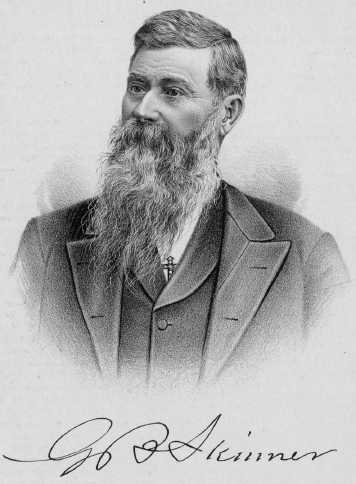worthy member of the Congregational
Church. Her mother was removed by death on the 11th of
June, 1875. A second alliance was entered into Aug. 7,
1877, when he was united in marriage to Miss Eliza A.
Dobson, daughter of Isaac and Rachel Amelia (Bates)
Dobson. The father of Mrs. Walton was a native of
Yorkshire, England, where he was born Oct. 1, 1808.
When about fifteen years of age he removed to Canada,
where he continued to reside until 1845, when he
entered Wisconsin Territory, and there remained some
twenty years. He then returned to Canada, where he
resided for six years, when he again entered the
United States and settled at Lincoln, Neb., in the
year 1871, continuing his residence there until June
13, 1882, at which time he crossed the river of death
to his long home, at the age of seventy-four years. He
was a member of the Christian Church, in which church
his wife also found her religious home. He was a
stanch adherent and strong advocate of the principles
of the Republican party. The mother was born at
Coburg, Ontario, Canada. March 14, 1818, where she
continued to reside until her marriage, Jan. 28,
1836.
Mrs. Eliza A. (Dobson) Walton was
born at Hazel Green, Wis., Feb. 27, 1849. She was
educated at Monroe, Wis., and after some years
residence with her parents in Canada removed with them
to Lincoln, Neb. Here she met the subject of this
sketch, and was afterward married to him. Three
children have been born to them: The first, Clara
Rachel, Oct. 15, 1878; her brother, Edwin Roger, Jan.
25, 1881; and the youngest, Ida Esther, June 10, 1885,
and died July 23, 1888. Mrs. Walton is a member of the
Congregational Church, where she is highly esteemed by
her fellow-members, and is always ready and heartily
willing to co-operate in the various departments of
church work and enterprise. She is an earnest
Christian woman, who is known among her best friends
as a model wife and mother.

 OL.
GEORGE B. SKINNER. The citizens of Lincoln need no
introduction to the gentleman whose history is herein
briefly outlined, who is at present in business as a
liveryman, but chiefly known perhaps in connection
with the temperance work, which he has carried on so
enthusiastically. Our subject was born in Vernon, near
the city of Hartford, Conn., on the 3d of January,
1833, and is the second son of Zenus B. and Anna
(Palmer) Skinner. This lady was the daughter of
Elliott Palmer, Esq., also of Connecticut. OL.
GEORGE B. SKINNER. The citizens of Lincoln need no
introduction to the gentleman whose history is herein
briefly outlined, who is at present in business as a
liveryman, but chiefly known perhaps in connection
with the temperance work, which he has carried on so
enthusiastically. Our subject was born in Vernon, near
the city of Hartford, Conn., on the 3d of January,
1833, and is the second son of Zenus B. and Anna
(Palmer) Skinner. This lady was the daughter of
Elliott Palmer, Esq., also of Connecticut.
Zenus B. Skinner, the grandfather of
our subject, was a soldier in the Revolutionary War,
and served throughout the entire seven years. A
portion of the time he was associated with Israel
Putnam, of historic fame. He was at the battle of
Bunker Hill, and took part also in the capture of
Burgoyne.
In his boyhood our subject continued
to live in his native town, and attended its public
schools. Later he received instruction in the
Ellington Academy, also at Wilbert, Mass., where he
continued to pursue his studies for two years. At the
age of seventeen he began dealing in horses on his own
account, and at twenty removed to Missouri, and
located at St. Joseph, where, for a time he was
engaged in pork packing. Afterward he ran a store in
Platte County, in the same State, continuing there
until 1858. The subsequent two years found him once
more engaged in pork packing, at St. Joseph. In the
spring of 1860 he took a train across the plains to
the Rocky Mountains, freighted with pork, groceries,
etc.
In 1861-62 Mr. Skinner took the beef
contract for supplying the army, and managed so wisely
and so well that the officers of the Government
expressed their entire satisfaction of the manner in
which he filled the same. Not long after this he was
appointed inspector of horses for the army, and bought
and sold large numbers of horses for army purposes.
Some time after this he equipped a train consisting of
fifteen wagons, at an outlay of $40,000, and again
crossed the plains to the Rockies. Selling out he
returned once more to the States, realizing a very
handsome result from his speculation.
In the winter of 1862-63 he took a
trip to the mountains owing to failing health; this
time he took a large supply of hams and other stores,
which he sold at Barnock City, realizing some $30,000
by the sale. He remained in the Territory of Idaho for
some five months, during which time his health was
completely restored.
|


